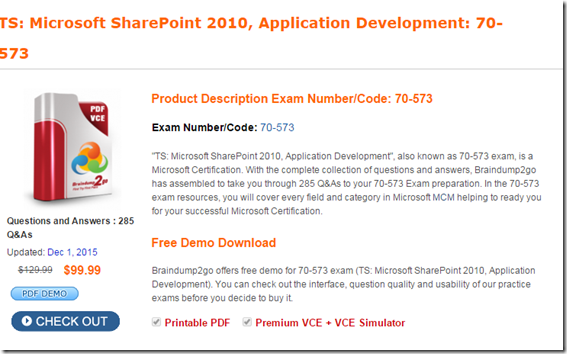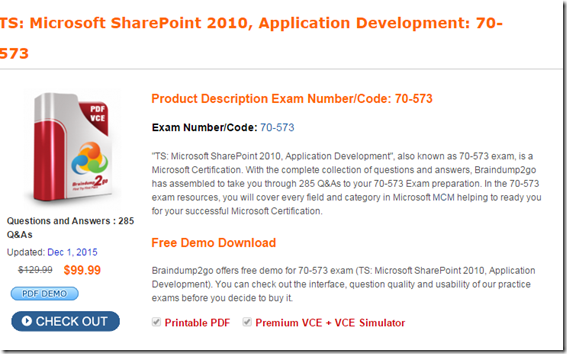MICROSOFT NEWS: 70-573 Exam Questions has been Updated Today! Get Latest 70-573 VCE and 70-573 PDF Instantly! Welcome to Download the Newest Braindump2go 70-573 VE&70-573 PDF Dumps: http://www.braindump2go.com/70-573.html (285 Q&As)
Braindump2go Guarantees Your Microsoft 70-573 Exam 100% Success with Our Unique Official 70-573 Exam Questions Resources! Braindump2go’s 70-573 Braindumps are Developed by Experiences IT Certifications Professionals Working in Today’s Prospering Companies and Data Centers! Braindump2go 70-573 Exam Dumps are Checked by Our Experts Team every day to ensure you have the Latest Updated Exam Dumps!
Exam Code: 70-573
Exam Name: TS: Microsoft SharePoint 2010, Application Development
Certification Provider: Microsoft
Corresponding Certifications: MCPD, MCPD: SharePoint Developer 2010, MCTS, MCTS: Microsoft SharePoint 2010, Application Development
70-573 Dumps,70-573 Latest Dumps,70-573 Dumps PDF,70-573 Study Guide,70-573 Book,70-573 Certification,70-573 Study Material,70-573 Exam Questions,70-573 Training kit,70-573 eBook,70-573 Exam Prep,70-573 Braindump,70-573 Practice Exam,70-573 Practice Test,70-573 Practice Questions,70-573 Preparation Material,70-573 Preparation Guide

QUESTION 231
You create a Feature.
You need remove the link to the Site Content Type page from the Site Settings page by using the Feature.
Which element should you use in the Feature?
A. ContentType
B. ContentTypeBinding
C. HideCustomAction
D. Module
Answer: C
Explanation:
MNEMONIC RULE: “remove = HideCustomAction”
Use the HideCustomAction element to hide an existing action that is implemented by default within theinfrastructure of Microsoft SharePoint Foundation Features, or within another custom action.
<HideCustomAction
GroupId = “Text”
HideActionId = “Text”
Id = “Text”
Location = “Text”>
</HideCustomAction>
HideCustomAction Element
http://msdn.microsoft.com/en-us/library/ms414790.aspx
QUESTION 232
You have a custom master page named MyApplication.master.
You need to apply MyApplication.master to only a custom application page in a SharePoint site. You must achieve the goal by using the minimum amount of effort.
What should you do?
A. Add a custom HTTP module to the Web application that modifies the master page.
B. Add a custom HTTP module to the Web application that modifies the custom application
page.
C. Set the MasterPageFile attribute to ~/_layouts/MyApplication.master in the @Page
directive of the customapplication page.
D. Rename the custom application page as application.master and overwrite the default application.master page in the 14\TEMPLATE\LAYOUTS folder.
Answer: C
Explanation:
MNEMONIC RULE: “custom master page = MasterPageFile”
Using a Page Specific Master Page in SharePoint 2010
http://kjellsj.blogspot.com/2010/07/using-page-specific-master-page-in.html
QUESTION 233
You develop a new publishing page layout named MyPage.aspx for a SharePoint site.
You create an Elements.xml file. Elements.xml contains the following code segment. (Line numbers are included for reference only.)
01<File Url=”mypage.aspx” Type=”GhostableInLibrary” IgnoreIfAlreadyExists=”TRUE”>
02<Property Name=”Title” Value=”MyPage” />
03<Property
Name=”ContentType”Value=”$Resources:cmscore,contenttype_pagelayout_name;” />
04<Property Name=”PublishingAssociatedContentType” Value=”;
05 #$Resources:cmscore,contenttype_page_name;;
06
#0x01010007FF3E057FA8AB4AA42FCB67B453FFC100E214EEE741181F4E9F7ACC432 78EE811;#”/>
07
08</File>
You need to prevent users from creating pages based on the page layout.
Which property tag should you add at line 07?
A. <Property Name=”Hidden” Value=”True” />
B. <Property Name=”PublishingHidden” Value=”True” />
C. <Property Name=”RequireSiteAdministrator” Value=”False” />
D. <Property Name=”Rights” Value=”ViewListItems” />
Answer: B
Explanation:
MNEMONIC RULE: “publishing page = PublishingHidden”
How to Restrict page layouts to specific Sites?
http://social.msdn.microsoft.com/Forums/en-US/sharepointdevelopment/thread/23f31f34-d244-46f4-8dbbca3405d3a6c6
QUESTION 234
You need to create a Web control that displays HTML content during the last stage of the page processing lifecycle.
Which method should you override in the Web control?
A. LoadControlState
B. Render
C. SaveViewState
D. SetDesignModeState
Answer: B
Explanation:
MNEMONIC RULE: “Render”
Render
This is not an event; instead, at this stage of processing, the Page object calls this method on each control. AllASP.NET Web server controls have a Render method that writes out the control’s markup to send to thebrowser.
If you create a custom control, you typically override this method to output the control’s markup. ASP.NET Page Life Cycle Overview
http://msdn.microsoft.com/en-us/library/ms178472.aspx
QUESTION 235
You need to create a Web control that displays an ASCX control.
Which event should you use?
A. CreateChildControls
B. LoadControlState
C. SaveViewState
D. SetDesignModeState
Answer: A
Explanation:
MNEMONIC RULE: “display ASCX control = CreateChildControl”
BaseFieldControl.CreateChildControls Method
http://msdn.microsoft.com/en-us/library/microsoft.sharepoint.webcontrols.basefieldcontrol.createchildcontrols.aspx
QUESTION 236
You have a Web Part named WebPart1.
WebPart1 runs on a Microsoft Office SharePoint Server 2007 server.
You need to ensure that WebPart1 can run as a sandboxed solution in SharePoint Server 2010. What should you do?
A. Create a new Web Part by using the code from WebPart1.
B. Create a new Visual Web Part by using the code from WebPart1.
C. Create an ASCX file for WebPart1, and then copy the file to the ISAPI folder.
D. Create an ASCX file for WebPart1, and then copy the file to the CONTROLSTEMPLATES
folder.
Answer: A
Explanation:
MNEMONIC RULE: “new Web Part”
Since sandboxed solutions have been introduced only with SharePoint 2010, your only option is to use theMOSS 2007 Web Part source code and create a new sandboxed Web Part.
QUESTION 237
You need to convert a user control named Control.ascx to a SharePoint Web Part.
The Web Part must be packaged as a user solution.
What should you do?
A. Modify the SafeControls section of the web.config file.
B. Copy the Control.ascx file to the ControlTemplates folder.
C. Create a new Visual Web Part and use the existing MyControl.ascx file.
D. Create a new Web Part and reuse the code from the MyControl.ascx file.
Answer: D
Explanation:
MNEMONIC RULE: “Create a new Web Part”
Since you already have a user control, you don’t need to create a Visual Web Part (by dragging-and-droppinguser controls from the Toolbox).
QUESTION 238
You plan to create a Web Part for a SharePoint site.
You need to ensure that the Web Part can send data to other Web Parts in the site.
What should you do?
A. Implement the IAlertNotifyHandler interface.
B. Implement the IAlertUpdateHandler interface.
C. Create a custom interface that uses the WebBrowsable and the WebPartStorage attributes.
D. Create a custom interface that uses the ConnectionProvider and ConnectionConsumer
attributes.
Answer: D
Explanation:
MNEMONIC RULE: “send data = Provider/Consumer”
Connect Web Parts in SharePoint 2010
http://msdn.microsoft.com/en-us/library/ff597538.aspx
QUESTION 239
You create a SharePoint farm solution that contains a Web Part.
You need to debug the Web Part by using Microsoft Visual Studio 2010.
To which process should you attach the debugger?
A. owstimer.exe
B. spucworkerprocess.exe
C. spucworkerprocessproxy.exe
D. w3wp.exe
Answer: B
Explanation:
MNEMONIC RULE: “Sandbox worker needs no proxy”
To provide additional protection, the solution’s assembly is not loaded into the main IIS process (w3wp.exe).
Instead, it is loaded into a separate process (SPUCWorkerProcess.exe).
Sandboxed Solution Considerations
http://msdn.microsoft.com/en-us/library/ee231562.aspx
If the project type lets you change the Sandboxed Solution property and its value is set to true, then thedebugger attaches to a different process (SPUCWorkerProcess.exe).
Debugging SharePoint Solutions
http://msdn.microsoft.com/en-us/library/ee231550.aspx
QUESTION 240
You create and deploy a custom Web Part.
You add the Web Part to a page and receive a run-time error.
You need to display the detailed information of the error on the page.
Which two actions should you perform? (Each correct answer presents part of the solution. Choose two.)
A. In the web.config file, set CallStack=”True”.
B. In the web.config file, set customErrors=”RemoteOnly”.
C. In the registry, set the EnableDebug value to 1.
D. In the registry, set the DisableLoopbackCheck value to 1.
Answer: AB
Explanation:
MNEMONIC RULE: “Check all with web.config”
Turning off custom errors in _layouts Web.Config for debugging mode in SharePoint 2010
http://www.khamis.net/blog/Lists/Posts/Post.aspx?ID=12
Braindump2go Regular Updates of Microsoft 70-573 Preparation Materials Exam Dumps, with Accurate Answers, Keeps the Members One Step Ahead in the Real 70-573 Exam. Field Experts with more than 10 Years Experience in Certification Field work with us.
FREE DOWNLOAD: NEW UPDATED 70-573 PDF Dumps & 70-573 VCE Dumps from Braindump2go: http://www.braindump2go.com/70-573.html (285 Q&A)